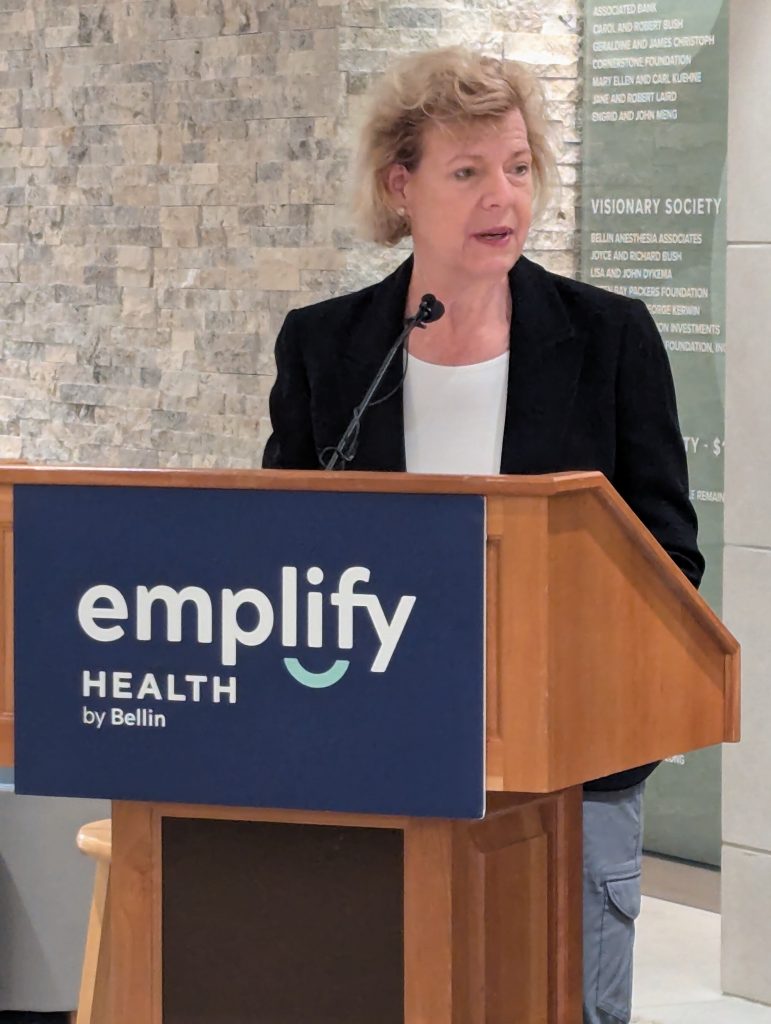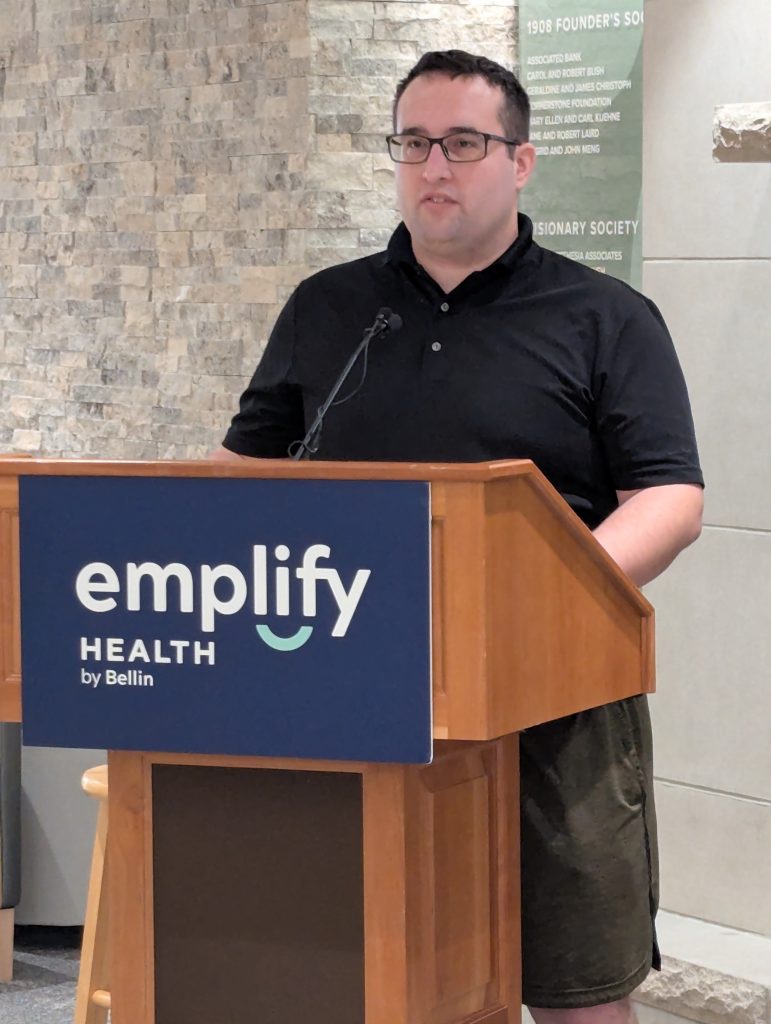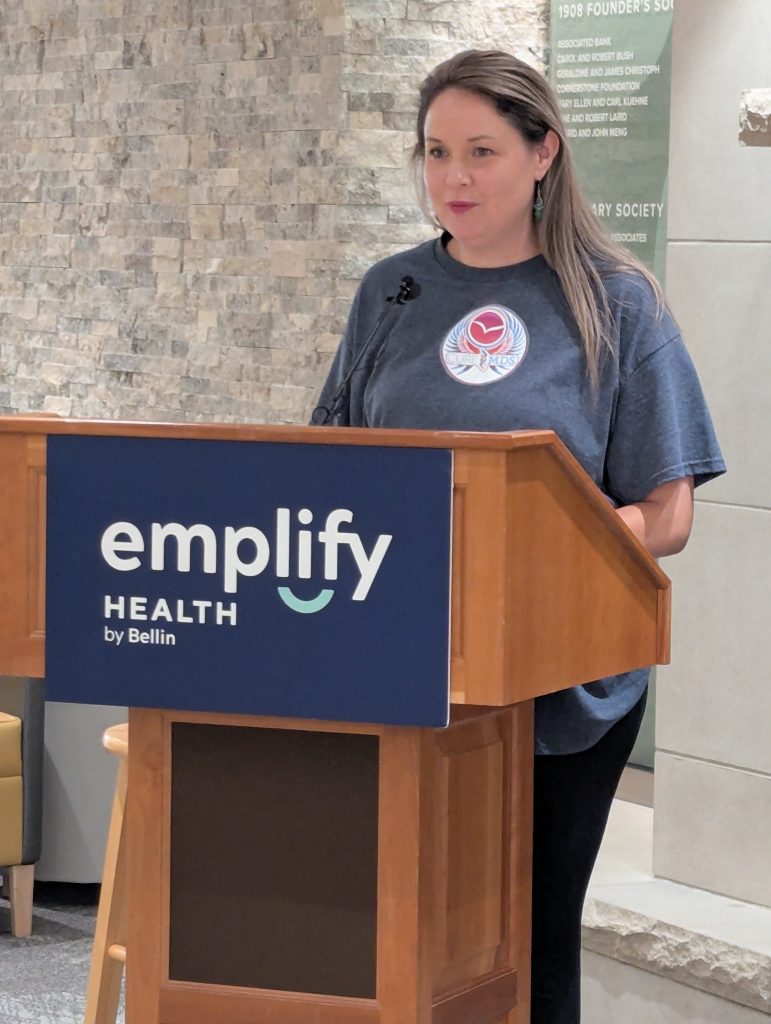
Source: Lisa M. Hale/Civic Media
Baldwin continues to fight Medicaid cuts with visit to Green Bay
GREEN BAY, WI—(WGBW)— U.S. Senator Tammy Baldwin toured the emergency services department of Emplify Bellin Health’s Green Bay hospital Saturday. Her visit had two objectives. The first was to understand how the emergency department operates currently and to gauge the impact of Medicaid cuts on patients, the hospital, and physicians. The second objective was to draw attention to the real human stories of those on Medicaid and how they will be affected.
Emergency Department Tour
Dr. Bradley Burmeister, Emergency Medicine Physician at Emplify Health by Bellin, led the Senator, reporters, and various staff on a tour of the emergency department. Highlighting areas where patients receive care, testing, and more.
He told the Senator that fewer patients on Medicaid will affect care in the long run.
“By both law and our moral ethics as emergency physicians, we like taking care of everyone whenever they need it. I don’t even know what type of insurance people have, right? Burmeister told Baldwin, “But when we’re gonna see less people on Medicaid and we’re going to have folks skimming off the top for profit, that really sort of puts the squeeze on us to make sure we can continue viability and hopefully afford an expansion. So we can continue to deliver the care that we need.”
Medicaid Cuts
Following the tour, hospital dignitaries joined Medicaid users to put a real, human face on the issue of Medicaid cuts in a press conference.
The budget bill passed by the United States House and Senate and signed by President Donald Trump will result in over 270,000 Wisconsinites losing Medicaid, or as it’s called in Wisconsin, Badger Care coverage. Baldwin said that it will strip $264 million a year from Wisconsin hospitals and will raise costs for families.
Dr. Cynthia Lasecki, Co-Chief Clinical Officer of Emplify Health, said when people can’t afford health insurance, they forgo preventative care. They can end up using emergency rooms as primary care providers.
“Even without health insurance, people will still need care,” said Lasecki. “When they cannot afford it, those costs get shifted to everyone else, driving up the total cost of care. It is a lose-lose for our patients and communities.”
U.S. Senator Baldwin said when talking about the budget bill that it is about more than just the numbers. It’s about the people.

“We always recite the numbers, but we’re talking about people who are our families, our neighbors, our friends,” Baldwin said. “And let me be very clear, this measure that was passed last week will hurt our state. This bill will hurt the over 270,000 Wisconsinites who will have their health care terminated. 270,000. That’s just about the entire population of Brown County. Just think about that.”
Families impacted by Medicaid cuts
James Harris told the story of his 4-year-old son being diagnosed with leukemia. In one month, medical care for his son resulted in a six-figure medical bill.
“Access to Medicaid literally saved myself and my family from bankruptcy. And it goes past that though, because I am still dependent on Medicaid to this day,” Harris said. “When you cut Medical Care, it ruins lives. It ruins lives in some really big, dramatic ways, but it also ruins lives in the quieter ways that aren’t so visible. I’d just like to say to all the politicians that supported this big, beautiful bill that your political grandstanding will have a real human cost.”

Jamie Willett is a single mother to twin sons who have a progressive neurological disorder. They see 10 specialists through Children’s Wisconsin. They are on Medicaid, which allows them to see their doctors and receive support from occupational therapy, speech, physical therapy, and more. And because Willet provides all the care for her disabled sons, she cannot work and is on Medicaid as well.

“Because I am unable to work, my health relies on Medicaid, both physically and mentally. This is important because my children need a healthy, strong parent to care for and advocate for them. It is salient that parents in my situation continue to have access to Medicaid.”
How to push back
Baldwin said that the bill may have passed. But it did so with a tie-vote broken by Vice President J.D. Vance. And the fight is not over. There are still things that people can do. Most importantly, she advised contacting Senators, Representatives, and state lawmakers, too.
“It’s not the last act that Congress will ever take. We will have future opportunities to fix. Fix some of the problems. But that will only happen if pressure on those who voted for it is such that they are hearing from their constituents that this was a mistake. And that Congress needs to. To repair it,” Baldwin said. “It was really apparent that also calling your state legislators was important…The state budget was passed just a few days ago. And they took some steps, knowing that this bill was about to most likely pass at the federal level, to try to make sure that there are more state dollars available to preserve some of the important healthcare and services that Medicaid offers. So that probably wouldn’t have happened if state legislators were not also hearing about the impact that this measure would have”.
Senator Baldwin stated that as the budget bill takes effect, it will introduce more red tape, barriers to coverage, and requirements designed to terminate coverage and support for Medicaid users.
“That’s for a combination of reasons, including the imposition of new red-tape barriers. Individuals who are able to work on Medicaid already work. They are going to impose new reporting requirements that are widely understood to be so cumbersome that many people who are duly eligible for Medicaid will see their coverage terminated. See their coverage drop for the inability to meet those red-tape requirements,” Baldwin explained.
The Republican U.S. Senator from Wisconsin, Ron Johnson, voted for the budget bill. Eighth Congressional District US Representative Tony Wied (R-De Pere) and Glenn Grothman (R-Fond du Lac) from the 6th Congressional District also voted for Trump’s budget bill.
Want More Local News?
Civic Media
Civic Media Inc.
The Civic Media App
Put us in your pocket.